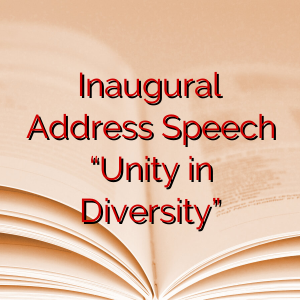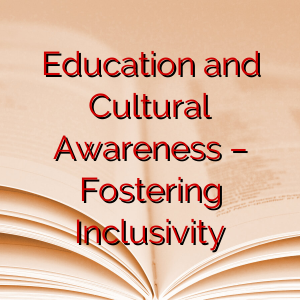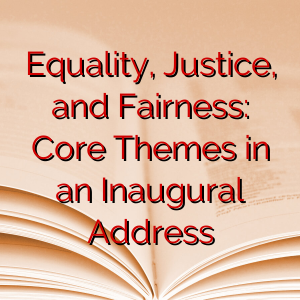The Power of Unity and Inclusivity – Crafting an Inaugural Address for All
In the grand theater of democracy, an inaugural address is not merely a speech; it is a promise, a vision, and a call to action. It is the moment when a leader steps forward to inspire and guide a diverse and multifaceted nation. Elected to the highest office, the leader has the unique opportunity to bring together citizens from every race, religion, political party, and creed under a single banner of unity and inclusive. In this essay, we will explore the significance of embracing diversity and delve into the key elements of an inaugural address aimed at inspiring and uniting a nation as diverse as ours.
class=”text-body font-regular text-gray-800 leading-[24px] pt-[9px] pb-[2px]” dir=”ltr”>Understanding the Mosaic of Diversity
The first step in crafting an inaugural address that resonates with citizens of every background is to understand the diverse mosaic that makes up the nation. Diversity encompasses various aspects, including racial, religious, political, and ideological differences. To inspire and unify such a diverse population, it is crucial to acknowledge and respect these differences while emphasizing what unites us as a nation.
Our nation is a tapestry of races, ethnicities, and cultures. It is home to people of all colors and backgrounds, each contributing to the rich fabric of our society. In recognizing and celebrating this diversity, we honor the collective history and experiences that have shaped our nation. It is this diversity that has led to our resilience and adaptability in the face of challenges, and it is this diversity that we must embrace wholeheartedly.
Moreover, the religious and spiritual diversity within our nation is a testament to the fundamental value of freedom of religion. Our Constitution enshrines the principle that individuals have the right to practice their faith or choose not to do so. Inclusivity in an inaugural address must underscore this fundamental right while fostering respect and understanding among various religious groups.
The political and ideological spectrum in our country is as broad as the horizon, with citizens passionately advocating for their views. A leader’s role is not to impose a singular ideology but to create a platform for constructive dialogue and cooperation, where diverse political perspectives can coexist peacefully.
The Components of an Inaugural Address for All
In crafting an inaugural address that speaks to every citizen, certain components must take center stage. The overarching theme should be one of unity in diversity, a vision of a nation that embraces differences while recognizing our shared goals and values. Here are some key elements to include:
- A Call for Mutual Respect: To unite a diverse nation, it is imperative to call for mutual respect among its citizens. In the inaugural address, the leader can set the tone by emphasizing that no matter our differences, respect for one another is non-negotiable.
- Recognition of Common Values: Despite our diversity, there are values and principles that bind us together as a nation. These might include freedom, justice, equality, and the pursuit of happiness. In the inaugural address, these common values should be celebrated and reaffirmed.
- Acknowledgment of Historical Injustices: A leader must acknowledge historical injustices and prejudices, as doing so is essential for healing and moving forward as a united nation. By addressing these issues openly and honestly, a leader can build trust among marginalized communities.
- Commitment to Equal Opportunity: Inclusivity means ensuring that all citizens have an equal opportunity to succeed, regardless of their background. The inaugural address should convey the leader’s commitment to creating a level playing field for everyone.
- Civic Engagement: Encouraging civic engagement is a critical aspect of inspiring unity. The leader can emphasize the importance of participating in the democratic process, respecting the rule of law, and working together for the common good.
- Concrete Policy Proposals: An inaugural address should not be a mere exercise in rhetoric; it should outline concrete policy proposals and initiatives that demonstrate the commitment to unity and inclusivity. These may include economic policies that address inequality, educational reforms, and social justice measures.
- Inspirational Stories: To connect with citizens on a personal level, the leader can share inspirational stories of individuals who have overcome adversity, illustrating the nation’s capacity for resilience and progress.
- A Vision for the Future: Finally, an inaugural address should paint a vivid and hopeful vision of the future. It should convey the idea that we are embarking on a shared journey, and by working together, we can achieve greatness.
Conclusion
In summary, an inaugural address for a diverse and inclusive nation is a delicate balancing act. It requires a leader to recognize and respect the differences that make the nation vibrant while emphasizing the values and principles that bring citizens together. By addressing the diverse aspects of our society with sensitivity and inclusivity, a leader can inspire and unite a nation, setting it on a path toward progress and harmony.

Hello! Welcome to my Blog StudyParagraphs.co. My name is Angelina. I am a college professor. I love reading writing for kids students. This blog is full with valuable knowledge for all class students. Thank you for reading my articles.




